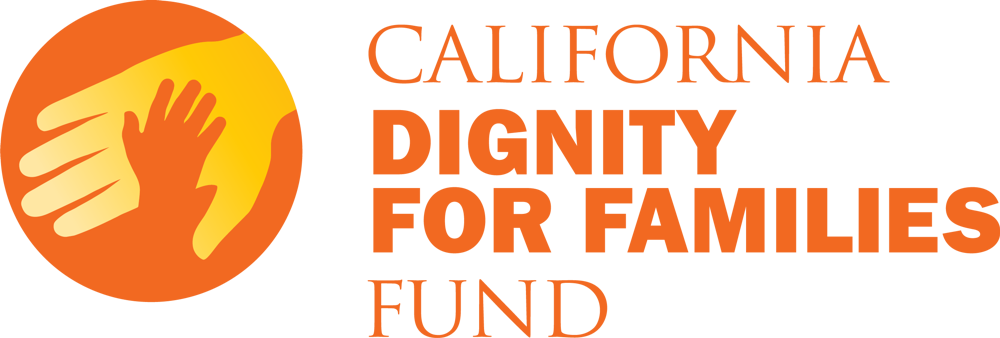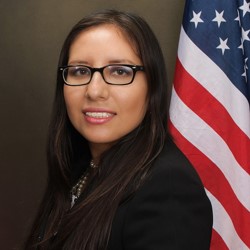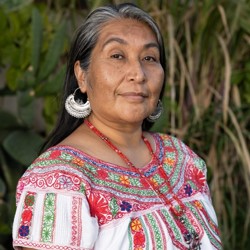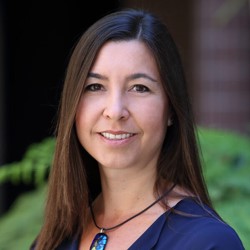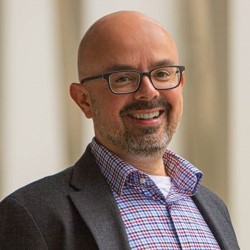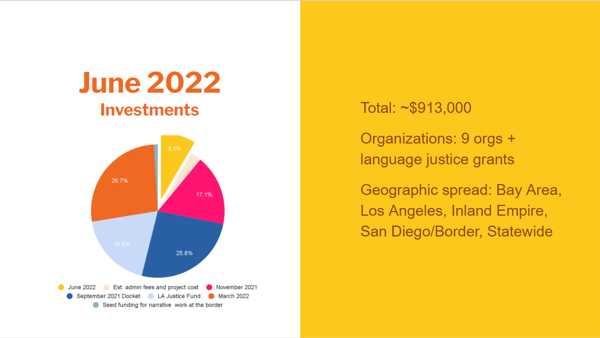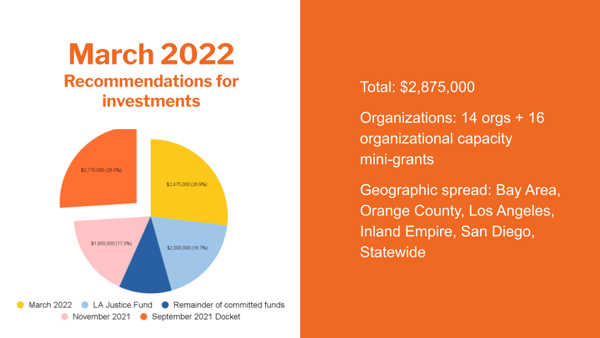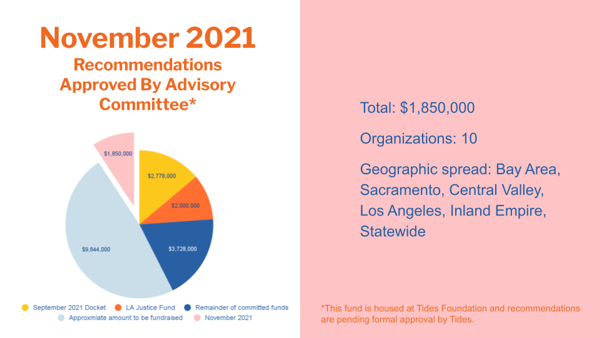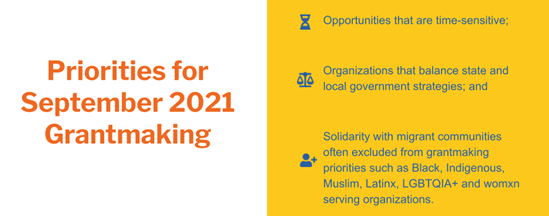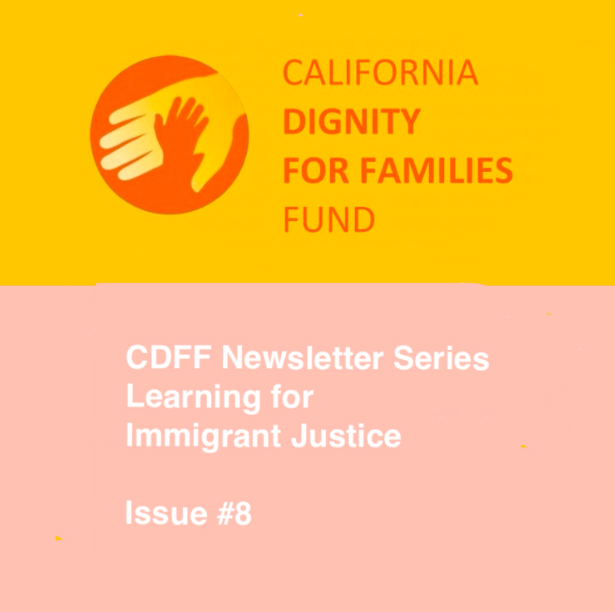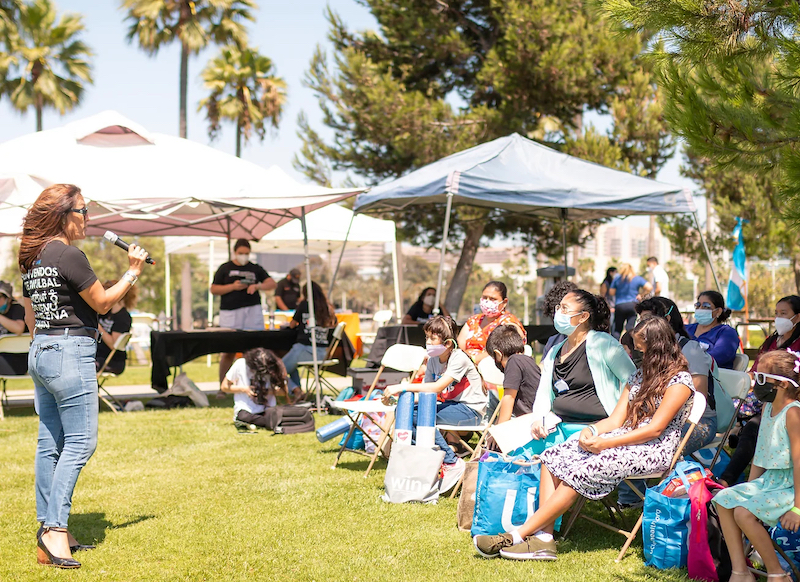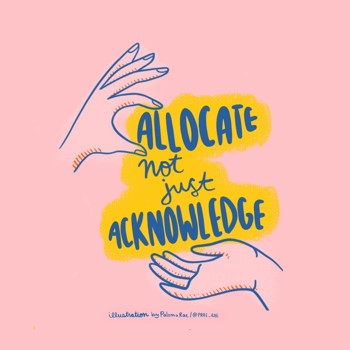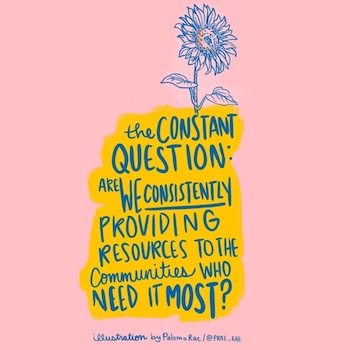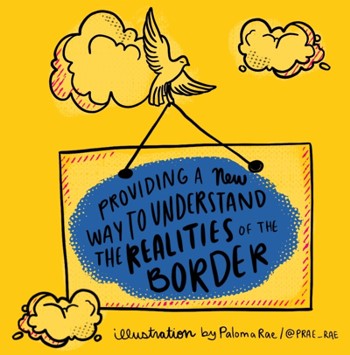California Dignity for Families Fund
The California Dignity for Families Fund helps migrant families and unaccompanied children at the U.S.-Mexico border and newly arriving Afghan and Haitian migrants receive urgent humanitarian relief and assistance as they request asylum and resettle in communities throughout the state.
Many migrants have arrived at the southern U.S. border fleeing persecution, violence, poverty, and the devastating impacts of climate change. Under the previous federal administration, they were forced to wait in Mexico in harsh and dangerous conditions. They, along with more recent migrants, are now arriving in the United States in record-breaking numbers. An astounding number are children traveling alone. The California Dignity for Families Fund honors the courage and humanity of these migrants and seeks to restore dignity to the asylum process.
The California Dignity for Families Fund is part of a public-private partnership with Governor Gavin Newsom, who made an aligned investment of $25 million for services to unaccompanied youth and children in support of the safety and well-being of families, especially newcomer youth as they settle and integrate into California communities.
Launched in 2021, the Fund aims to:
- Ensure due process for asylum seekers
- Support the integration of migrant families and unaccompanied children into receiving communities
- Build the power of migrants historically excluded from philanthropy and other critical decision-making spaces
GCIR is the lead organization guiding the Fund’s strategic direction, fund development, and implementation.
What Makes This Fund Unique?
CDFF is guided by a set of principles intended to influence how philanthropy engages with migrant communities and to inform how it redistributes resources. These principles are grounded in trusting relationships among diverse stakeholders and in centering the expertise of movement leaders.
Valuing the knowledge and listening to the experiences of immigrant justice movement leaders allows us to gain a deeper understanding of the needs of migrants at the border and the needs of the non-profits doing the work to serve and advocate for them. By doing so, we can build an effective and sustainable support infrastructure that will address and engage the challenges facing migrants as they arrive in the U.S.
The CDFF Principles:
- Establishment and commitment to a clear set of values that guide CDFF and are in alignment with principles held by the Advisory Committee, particularly movement leader members of the committee
- Intentional and purposeful formation of an Advisory Committee largely composed of field leaders and movement experts representing diverse organizations, perspectives, and experiences
- Inclusion of a grantmaking consent process that honors the diversity of opinion of the Advisory Committee and welcomes generative conflict and positive tensions
- Adoption of practices that uplift “grantmaking in a networked way” including (1) following the lead of those closest to the ground; (2) deep commitment to inclusive learning and sharing knowledge with key stakeholders, serving as a network connector; and (3) rapid and equitable distribution of funds to strengthen movement infrastructure over the longer term
CDFF sees the following priorities as fundamental:
- Necessary transactional services that meet the immediate humanitarian and legal needs at the border and into the initial migration cities
- Coordinated and transitional care that offers holistic case management and helps expand legal services into the destination regions of migrant families and unaccompanied children
- Transformative opportunities that strengthen the immigrant justice movement infrastructure over the long term
- Flexible funds that supplement overall strategy investments and incorporate knowledge of migrant communities often excluded from grantmaking priorities
CDFF Resources:
- Learning Framework
- Exploratory Phase Learning Memo (November 2021)
- Learnings from the Field Brief (August 2022)
- Learnings from the Field Brief - Summary Version (August 2022)
- Eight-part Learning Series
- Monthly Newsletter Series
To learn more, please contact [email protected].
“California’s diversity makes us a more vibrant and resilient state, and we are a better place because of our immigrant communities. I am grateful to our philanthropic partners raising an additional $20 million to support newly arrived migrant families, including newly arrived children and youth, through the California Dignity for Families Fund,” said Governor Newsom.
“We feel compelled to invest in this crucially important and urgent effort to reimagine support services to migrants in California and to restore dignity to the asylum process,” said Don Howard, President and CEO of The James Irvine Foundation. “Those who are arriving in California need this assistance and, at the same time, we can pilot a better system for welcoming immigrants into this state.”
Top Photo: Bruno Nascimento/Unsplash License
Bottom Photo: Omar Lopez/Unsplash License
We are incredibly grateful to the following supporters of the California Dignity for Families Fund.
Crankstart
“Migrant families desperately need a restored asylum process and streamlined humanitarian relief at the border,” said Laurene Powell Jobs, Founder and President of Emerson Collective. “I commend Governor Newsom’s leadership and hope others will join these efforts.”
“Addressing the humanitarian crisis at the California border requires meaningful long-term investment in infrastructure and system change,” said Antonia Hernández, President and CEO of the California Community Foundation. “The support of public-private partnerships like the California Dignity for Families Fund and innovative programs like the L.A. Justice Fund, which ensures due process and protections for immigrant families, are critical to meet the needs of our most vulnerable migrant communities. When the state, counties, cities, and philanthropy work together across sectors, sustainable solutions are possible.”
“The Haas, Jr. Fund believes in community, family, and human rights, and we look forward to working with other funders through the California Dignity for Families Fund to help make our southern border more reflective of our nation’s highest ideals,” said Cathy Cha, President and CEO of the Evelyn and Walter Haas, Jr. Fund. “By working together, philanthropy can ensure that immigrants at the border have access to critical services and supports, and that they are treated with the dignity they deserve.”
“Immigrant families who are striving to create better, safer, more secure lives for themselves in California should receive respect and care as they forge their new paths,” said Nicole Taylor, President and CEO of Silicon Valley Community Foundation. “This new fund will help uphold this ideal, and Silicon Valley Community Foundation is proud to be part of this effort.”
“TCE is pleased to join our philanthropic colleagues in support of this effort, and it will require a concerted public-private partnership to bring some measure of dignity and humanitarian support to families impacted by this crisis,” said Dr. Robert K. Ross, President and CEO of The California Endowment.
"Vulnerable children and families are in urgent need of humanitarian aid and refuge," said Miguel A. Santana, President and CEO of the Weingart Foundation. "We are proud to contribute to this Fund, which will create systems to protect families seeking asylum and support their long-term well-being."
The California Dignity for Families Fund is guided by an advisory committee with deep movement, community, government and philanthropic experience. This team has been charged with setting the Fund’s grantmaking strategy as well as selecting the partner organizations to receive grants. We are so grateful to Dulce Garcia (Border Angels / San Diego Immigrant Rights Coalition), Mitzie Perez (California Immigrant Youth Justice Alliance), Odilia Romero (Comunidades Indigenas en Liderazgo [CIELO]), Ola Osaze (Black LGBTQIA+ Migrant Project [BLMP]), Dan Torres (Evelyn & Walter Haas, Jr. Fund), Rosie Arroyo (California Community Foundation), and Megan Thomas (Catalyst of San Diego and Imperial Counties) for joining Marissa Tirona (GCIR) on the California Dignity for Families Fund Advisory Committee.
|
|
|
|
|
|
|
|
Grantmaking in a Networked Way
At the Fund, we:
- Leverage the power of strategic agility, inclusive learning, and deep collaboration. With our balcony view and influence as funders, we connect key stakeholders.
- Follow the lead of those closest to the ground. Our advisory committee has deep movement, community, government, and philanthropic experience; expertise on the southern California border and with transnational issues; and grassroots perspectives often excluded from philanthropic conversations.
- Aim to distribute funds rapidly and equitably, and to strengthen movement infrastructure over the longer term.
Fourth Docket - June 2022
The Fund’s fourth round of investments prioritized resourcing migrant communities often excluded from grantmaking priorities; deepening support along the continuum of care; supporting broader immigrant justice networks and ecosystems; balancing state and local government strategies; and supporting planning and strategizing efforts.
Selection of grantee organizations for this round of grantmaking was also informed by learnings from evaluation interviews of non-profit partners conducted in February and March 2022, and by recommendations from the Fund’s advisory committee, one of which was to prioritize organizations focusing on policy and programmatic change in the Southern border region.
- Border Butterflies, a project of Transgender Law Center
- Casa Arcoiris
- Comite Civico Del Valle, Inc.
- Comunidades Indígenas en Liderazgo (CIELO)
- Council on American-Islamic Relations, California
- Inland Coalition for Immigrant Justice
- Mujeres Unidas y Activas
- Refugee Health Alliance
- Grantmakers Concerned with Immigrants and Refugees (GCIR)
Third docket - March 2022
The selection of the Fund’s third round of investments prioritized resourcing migrant communities often excluded from grantmaking priorities; strengthening the capacity of immigrant justice organizations and leaders; deepening support along the continuum of care; strengthening hubs and networks in the immigrant justice ecosystem; and balancing state and local government strategies.
These investments supported integration of legal and social services for migrant youth, infrastructure and capacity building in Inland California, policy change, and youth-led narrative work.
Grantees
- African Communities Public Health Coalition
- Alianza Translatinx (fiscally sponsored by TransLatin@ Coalition)
- Alliance San Diego
- Black Alliance for Just Immigration (BAJI)
- California Collaborative for Immigrant Justice (CCIJ)
- California Immigrant Policy Center (CIPC)
- Culturally Responsive Domestic Violence Network
- El/La Para Trans Latinas (fiscally sponsored by Community Initiatives)
- Familia TQLM (fiscally sponsored by Mexican American Legal Defense and Educational Fund)
- Pilipino Workers Center
- Refugee Children Center
- Students Without Limits
- TODEC Legal Services
- TransL@tina Coaliton
Second Docket - November 2021
In November 2021, the advisory committee recommended another set of grants totalling $1.85 million.
These recommendations prioritized opportunities that balance state and local government strategies, focus on ”Coordinated + Transitional” and “Transformative” opportunities, support settlement and navigation for migrant children, unaccompanied minors and refugee youth, and resource and strengthen migrant communities often excluded from grantmaking priorities.
Grantees
- California Immigrant Youth Justice Alliance
- California Rural Legal Assistance Foundation
- Central American Resource Center, Los Angeles
- Central Valley Immigrant Integration Collaborative
- Immigrant Defenders
- Kids in Need of Defense, Central Valley
- Legal Services for Children
- National Center for Youth Law
- Oakland Public Education Fund
- Public Counsel
First Docket - September 2021
The Fund’s first set of recommendations was informed by the knowledge and expertise of leaders from the community, the advisory committee, state partners, GCIR, the L.A. Justice Fund, and over 25 interviews with key movement stakeholders, including social service providers, advocates, immigration legal services providers, and community rooted leaders.
We prioritized opportunities that are time-sensitive; organizations that balance state and local government strategies; and solidarity with migrant communities often excluded from grantmaking priorities, such as Black, Indigenous, Muslim, Latinx, LGBTQIA+ and womxn serving organizations.
Grantees
- Al Otro Lado, Inc.
- Border Angels
- Black LGBTQIA+ Migrant Project (BLMP)
- Border Butterflies, a project of Transgender Law Center
- Centro Binacional para el Desarrollo Indígena Oaxaqueño (CBDIO)
- Centro Legal de la Raza
- Comunidades Indígenas en Liderazgo (CIELO)
- Haitian Bridge Alliance
- Mixteco/Indigena Community Organizing Project (MICOP)
- Muslim American Society Social Services Foundation
- Pars Equality Center
- Partnership for the Advancement of New Americans (PANA)
- The Afghan Humanitarian Parole Project, a project of Pangea Legal Services
This limited mailing of 8 bi-monthly newsletters highlighted the work and insights of non-profit organizations that were funded by the California Dignity for Families Fund (CDFF), a collective action fund that supported the urgent humanitarian needs of migrants at the U.S.-Mexico border and new arrivals from Afghanistan and Haiti.
This series of newsletters covered topics such as:
- A holistic approach to services that combines legal and humanitarian support
- The dire need for access to in-language, culturally appropriate services
- The mental health challenges of both immigrants and those working to support them
- How best to meet the needs of unaccompanied migrant youth
Learn more about the Dignity Fund’s work and learnings below!
issue 8
The final issue of the California Dignity for Families Fund (CDFF) Newsletter Series: Learning for Immigrant Justice is now out! Learn more about our key findings over the last year:
- Principles of the fund
- The value of investing in rural communities
- Holistic case management
- Seeding the growth of BIPOC leadership
- Language access
- Legal services for migrants
- Unaccompanied youth migrants and mental health
An extra big thank you goes to the CDFF nonprofit partners who took the time to share their thoughts and insights on the topics we covered.
Access our final issue here.
issue 7
Over the past ten years, the United States has apprehended and released more than 480,000 unaccompanied immigrant and refugee children to sponsors – all of whom made the risky journey to cross the border into the U.S. without their parents. Many, if not all, were fleeing dangerous situations in their home countries.
In the latest issue of the CDFF Newsletter Series, we speak with Kids in Need of Defense (KIND) and Legal Services for Children (LSC) to find out more about unaccompanied youth crossing the border, the needs of migrant children, the impact of trauma, and mental health.
issue 6
In this issue, we spotlight the importance of providing legal services and support to migrants. Learn more about how organizations like Central Valley Immigrant Integration Collaborative, Al Otro Lado, MICOP, and Immigrant Defenders Law Center are providing crucial legal services to their clients, and how you can support their efforts.
Our thanks to Immigrant Defenders Law Center for use of this photo.
issue 5
With over 40 langauges spoken by incoming migrants at the border, having a diverse network of interpreters is critical. In issue #5 of the CDFF newsletter, we examine the importance of language access and how groups like Comunidades Indígenas en Liderazgo (CIELO) and Partnership for the Advancement of New Americans (PANA) are working to meet these language needs.
issue 4
In issue #4 of the CDFF newsletter, we explore the racial disparities in nonprofit leadership and grantmaking priorities, and find out how philanthropy can make a change by re-prioritizing funding and support to seed the growth of BIPOC-led nonprofits.
issue 3
In issue #3 of the CDFF newsletter, we explore the concept of holistic case management and how it can be a powerful tool for meeting the legal and humanitarian needs of migrants.
We hear from nonprofit organization Al Otro Lado about how they utilize holistic case management to support their clients on a long term basis. Read issue #3 here.
ISSUE 2
As we sit down for holiday meals this season, we don’t often think about where our food comes from and who grows it. It’s easy to forget about the farmworkers – many of whom are immigrants – facing dangerous and often exploitative working conditions while performing the most essential work.
In issue #2 of the CDFF Newsletter: Learning for Immigrant Justice, we learn more about nonprofit organizations serving immigrant communities in rural California. We also interview Ivy Suriyopas, Vice President of Programs at GCIR, and find out why investing in rural communities is crucial. Read issue #2 here.
Issue 1
The recent political stunts of relocating migrants to Martha’s Vineyard, Washington D.C., and New York City distract us from the urgent needs of the 2.4 million people who arrived and were apprehended at the U.S.-Mexico border this year. We invite you to look past the media sensationalism of these stories and learn with us as we focus on the rights, wellbeing, and dignity of migrants and share insights from the work being done at the border to support them. Read issue #1 here.
What Makes This Fund Unique?
CDFF is guided by a set of principles intended to influence how philanthropy engages with migrant communities and to inform how it redistributes resources. These principles are grounded in trusting relationships among diverse stakeholders and in centering the expertise of movement leaders.
Valuing the knowledge and listening to the experiences of immigrant justice movement leaders allows us to gain a deeper understanding of the needs of migrants at the border and the needs of the non-profits doing the work to serve and advocate for them. By doing so, we can build an effective and sustainable support infrastructure that will address and engage the challenges facing migrants as they arrive to the U.S.
Read more about the fund’s principles, priorities, and advisory committee.
How does this fund connect with the State of California’s fund?
The California Dignity for Families Fund (the “Fund”) is a separate but complementary entity that disburses private contributions to support migrant families and unaccompanied children. However, the Fund is part of a public-private partnership with Governor Gavin Newsom, who has proposed an aligned investment of $25 million for services to unaccompanied youth and children in support of the safety and well-being of families, especially newcomer youth as they settle and integrate into California communities.
How do organizations apply for funding?
The fund is not accepting unsolicited proposals or inquiries at this time.
What are the funding criteria to receive support from the fund?
Funds will be distributed in an equitable and timely manner according to a set of criteria developed by an advisory committee, which comprises field experts and funders representing diverse organizations, perspectives, and experiences. Funding criteria will be established with an eye toward, among other things, meeting needs in heavily impacted regions, filling gaps in regions with limited fundraising capacity, and ensuring that dollars are equitably distributed across the state based on need.
When will grants be made to selected organizations?
Grants to organizations will be made on a rolling basis, with $2,778,000 recommended by the advisory committee for investments for the first round of grantmaking in September 2021. The majority of funding will be distributed as two-year, general operating support.
Who is overseeing the fund?
Grantmakers Concerned with Immigrants and Refugees (GCIR) serves as the lead organization for the Fund, responsible for strategic direction, fund development, and implementation. GCIR brings its more than 30 years of experience as the nation’s only immigrant-focused philanthropic network to oversee the Fund.
Tides Foundation acts as the fiscal manager for the Fund, helping to receive, disburse, and manage these critical resources to get them to heavily impacted border regions and destination communities. Tides is a philanthropic partner and nonprofit accelerator dedicated to building a world of shared prosperity and social justice. Innovative foundations look to Tides as a partner for grantmaking, collaboration, capacity building, and strategic thinking. Tides has helped some of the world’s most prominent foundations achieve their goals.
How can I donate?
Online donations can be made here.
Foundations and major donors that would like to contribute may contact [email protected].
